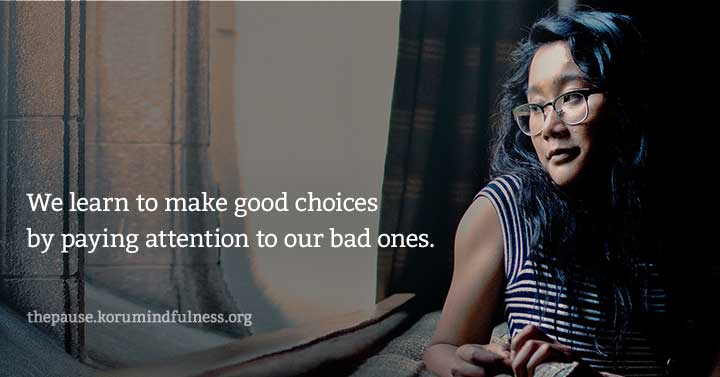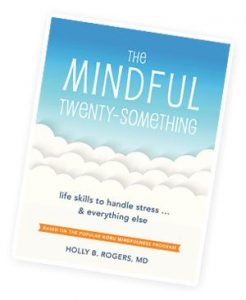
“Skillful Action: Look Before You Leap” is part 3 of our series on the traditional Eightfold Path for the cessation of suffering offered by the Buddha 2500 years ago. Missed our other posts? Read them all here.
Skillful Action is our next step on the Buddha’s Eightfold Path that takes us to the end of suffering. In case you missed it, in the first post in the series I set the stage for our journey.
Having covered Skillful Mindfulness last week, our next stop on the 8-step path to happiness is Skillful Action. The message of this step is easy and clear. Put simply, if you frequently do stuff that causes problems for you or other people, it’s almost impossible to feel happy and at peace.
That may seem like a no-brainer, but most of us, without even realizing it, go around doing things that interfere with our happiness and the happiness of others.
The secret to happiness: good choices
A young man, seeking to find happiness approached his teacher and asked her, “Wise teacher, what is the secret to happiness?”
She replied, “It is very simple. Good choices are the secret to happiness.”
The young man pondered this for a minute, and then asked, “How do I learn to make good choices?”
His teacher replied, smiling, “Wisdom. Wisdom allows you to know which choices are good.”
The student paused again, and then asked, “But how do I acquire wisdom?”
The teacher nodded her head, and said, “This too is simple. Bad choices.”
Bad choices can also be called “unskillful” choices. Whatever you call them, I’ve made plenty of them.
I know I’ve made a bad choice if something unpleasant comes from it. Sometimes the bad choice is clear and immediate, like when I tumbled off my bike for braking too hard on the gravel. Or when I made a friend cry because of a joke at her expense. That didn’t feel so good.
Sometimes the problems that result from an unskillful choice are more subtle, or show up much later. Like when I sent a not-so-nice text about a friend and then worried later that it would get back to her.
According to the Buddha, Unskillful Actions are those that create suffering for yourself or others. Skillful Actions are helpful, reduce harm, or promote peace of mind. For more about my use of the word “skillful” here, see my post from two weeks ago.

Finding your own moral compass
This is not meant as moralistic or judgmental. We have to stay mindful to avoid the trap of dualistic thinking: I’m good because I do good things, and you are bad because you do bad things. We all do some good things and some not-so-good things. We don’t make any progress if we get tied up in knots of self-criticism. The best we can do is to try to learn from our mistakes, making choices that are more helpful and less harmful when possible.
Keep in mind that the teaching about Skillful Action is meant to be a guide to developing your own moral compass. You choose your actions not because someone else tells you they are right or wrong. Rather, you learn from your personal experience that your life is happier when your actions promote peace of mind.
5 Unskillful Behaviors best avoided
In the traditional teaching about Skillful Action, there are 5 behaviors that are best avoided. They are known as the Five Precepts. If you are used to hearing about the Ten Commandments or other such lists, please recognize that this is a different kind of list.
These problematic behaviors are not offered as commandments that must be followed or orders that must be fulfilled. Instead they are guidelines for you to contemplate, and experiment with integrating into your life, noticing the impact they have.
From the Buddha’s perspective, it is impossible to make progress on the spiritual path that leads to the end of suffering if you don’t avoid this stuff:
1. Avoid killing
Sometimes this is broadened to more generally avoiding harming others. To practice with this principle, notice when you are tempted to hurt or kill anything, even a harmless bug. The simple practice of thinking twice before you kill even a bug, may help you develop more compassion for others.
2. Avoid stealing
This is broadened to avoiding taking anything that is not freely given, including other’s good ideas. Stealing almost always leads to worry and regret, or other types of trouble.
3. Avoid lying
Lies cause so much trouble. Regine acknowledged, “I said my grandma died to get out of a test. I’ve been miserable ever since. I’m so worried I’m going to get caught. I’d rather have failed the exam than be worrying about this.”
Lies are so problematic that they get their own step on the eightfold path, Skillful Speech.
4. Avoid sexual misconduct
In general, sexual behavior that is harmful in any way counts as “misconduct.” For example, these situations count:
- sex that is not fully consensual (see this great video to be clear about what counts as consensual)
- sex that violates someone’s trust (cheating on your sweetie)
5. Avoid misusing alcohol or other intoxicants
 Yeah, I know getting wasted is a popular pastime for many twenty-somethings, but there may be times when your boozing or drug use causes problems for yourself or someone else. For example, one student I know said, “I’m going to cut back for awhile. My roommate has had to save my ass when I was wasted one too many times. It’s just not worth it anymore.”
Yeah, I know getting wasted is a popular pastime for many twenty-somethings, but there may be times when your boozing or drug use causes problems for yourself or someone else. For example, one student I know said, “I’m going to cut back for awhile. My roommate has had to save my ass when I was wasted one too many times. It’s just not worth it anymore.”
Ask yourself, “Does my partying have any negative consequences?” If the answer is yes, then ask yourself:
“Am I able, all on my own, to shift my partying so that it doesn’t cause harm to anyone, including me?”
If the answer is no, get some help. Ask friends, ask family, or ask a professional. Problem drinking is the strongest predictor for failed marriages and derailed careers. And, in case you are wondering, those things do not lead to happiness.
The idea behind the Five Precepts is that you learn to pay attention when you do or are tempted to do any of these things. Over time, you may see that, as Henepola Gunaratana says:
“…[you learn to] avoid cruel and hurtful behavior because [you] see the consequences of such actions—that they lead to profound unhappiness for us and for everyone around us, now and in the future.”
Bottom line: It is just not possible to be happy if your actions frequently create discomfort, worry, or regret for you or others.
Your own experience is what counts
Don’t believe this is true just because I said it, or even because the Buddha said it. Try it out and see what you notice. Is your life easier if you are not plagued by even small amounts of worry and guilt over Unskillful Behavior? Do others treat you with greater kindness when you treat them that way?
And remember, as you become more aware of the results of your choices, you are likely to notice that you sometimes do things that don’t make you particularly proud. In those moments, don’t waste time beating yourself up about it. Make amends if needed, and resolve to avoid, as best you can, that particular behavior in the future.
Developing Skillful Actions is a process. I know I’m happier when I pay attention to the consequences of my actions. I’m curious to hear what you think.
Tell us about your experiences and what you’ve noticed in our comments below.
Get our latest articles in your inbox.
